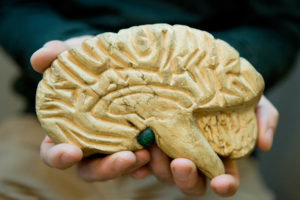Article and photos by MARGIE O’LOUGHLIN
 From his home office in the Longfellow neighborhood, Dr. Eilon Caspi (photo right) is doing all he can to humanize the face of Alzheimer’s disease and other forms of dementia. Caspi, who holds a Ph.D. in gerontology, has worked his whole adult life in the aging field, starting as an aide in a nursing home where his grandfather lived in Israel 23 years ago. He has been growing his business as founder, owner, and director of Dementia Behavior Consulting LLC since 2015.
From his home office in the Longfellow neighborhood, Dr. Eilon Caspi (photo right) is doing all he can to humanize the face of Alzheimer’s disease and other forms of dementia. Caspi, who holds a Ph.D. in gerontology, has worked his whole adult life in the aging field, starting as an aide in a nursing home where his grandfather lived in Israel 23 years ago. He has been growing his business as founder, owner, and director of Dementia Behavior Consulting LLC since 2015.
Caspi offers an array of services to people living with dementia, as well as their family care partners, staff, and other professionals in the healthcare system, nursing homes, and assisted living facilities. These services focus on preventing various forms of behavioral expressions, including those commonly labeled aggressive. Caspi believes that the majority of these distressing and harmful behavioral expressions are the result of unmet human needs intersecting with the person’s cognitive disabilities.
Caspi said, “The quality of care provided to people living with dementia is only as good as the quality of timely support and education provided to family and professional care partners.”
This conviction sets him apart from many specialists in his field. “I place the highest priority on equipping care partners with evidence-based knowledge and skills. This is what will empower them to provide effective, person-directed, dignified care to those living with dementia,” Caspi said,
 Photo left: Gerontologist and wood carver Dr. Eilon Caspi holding one of the brain hemispheres he has hand-carved from mahogany.
Photo left: Gerontologist and wood carver Dr. Eilon Caspi holding one of the brain hemispheres he has hand-carved from mahogany.
Caspi emphasized that the primary focus of Dementia Behavior Consulting LLC is on the reduction of the harmful stigma commonly associated with dementia, instilling realistic hope, and providing personalized psychosocial approaches—not drug treatments such as antipsychotic medications. “These expensive medications have been shown in a series of research studies to bring only modest positive effects to a small portion of people living with dementia,” Caspi said. “They often cause a number of adverse and serious side effects that outweigh the benefits.” That said, there are unique circumstances when these medications may need to be used thoughtfully and carefully (including Gradual Dose Reduction Guidelines).
Caspi explained, “There are 5.4 million people in The US estimated to be living with a form of dementia. For those who receive a diagnosis, they will typically leave their doctor’s office or diagnostic center (commonly called Memory Clinic), go home, read about their diagnosis online, and then they’ll panic. How do you find models of hope when there is so much misinformation out there? My passion is bringing evidence-based, best care practices to elders, families, and healthcare professionals in a timely way.”
From Dr. Caspi’s perspective, people living with dementia and those who are cognitively healthy have one very important shared asset: all human beings benefit from close, trusting relationships. “In many ways, people with dementia are just like the rest of us,” he said. “Unfortunately, psychological needs are among the first to be overlooked in home care situations, and (about 80% of people living with dementia are cared for at home) as well as in long-term care facilities.
He continued, “While Alzheimer’s disease and several other forms of dementia are progressive, highest practical psychological a high level of psychiatric well-being can be realized in many individuals when support systems and quality of care are optimized. Strengthening the support system to the person and her/his family care partners, timely evidence-based education, and reduction of fear and stigma—these are the things to focus on.”
It’s a known fact that the age pyramid in this country is shifting in a big way. The Baby Boomer generation contains about 76 million people in the United States. As they age, the number of people living with dementia is expected to soar. Some of the risk factors that may raise the likelihood of developing certain forms of dementia include poor diet, sedentary lifestyle, lack of cognitive stimulation, smoking, high blood pressure, high stress level, lack of personally meaningful social engagement, and lack of purpose in life. These factors are thought to be cumulative.
Caspi is looking for a senior volunteer (55+) to help him with office-based projects that will improve the lives of people living with dementia in Minnesota. To inquire, email him at eiloncaspi@gmail.com or contact him through his website at www.dementiabehaviorconsulting.com.
Comments
No comments on this item Please log in to comment by clicking here